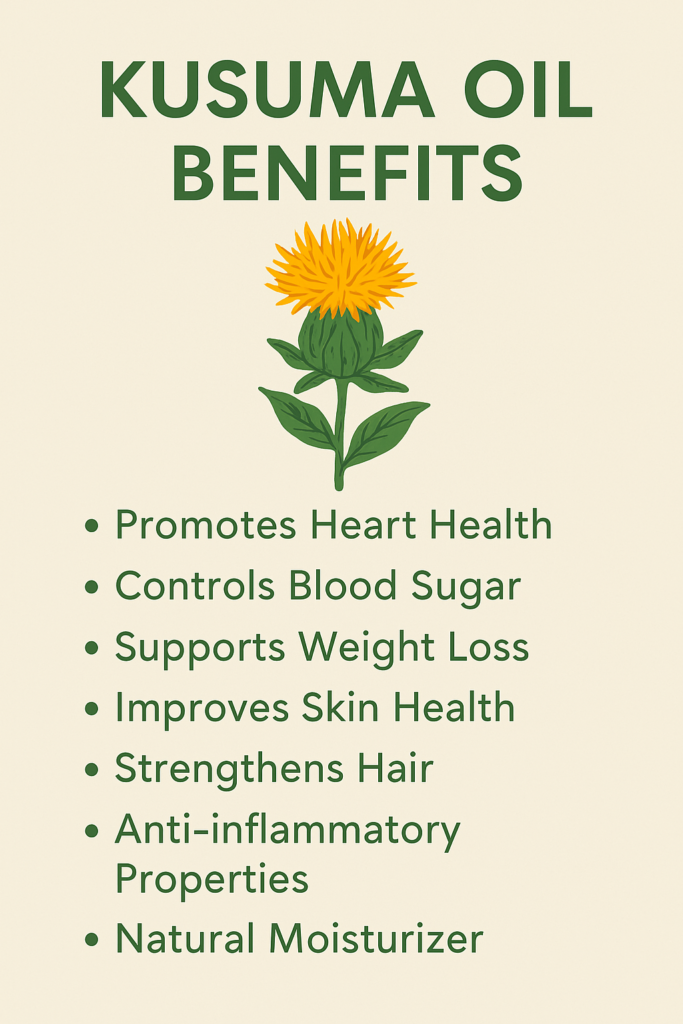Kusuma oil, commonly known as safflower oil, is a natural oil extracted from the seeds of the safflower plant (Carthamus tinctorius). This light, odorless oil has been used for centuries in Ayurvedic medicine and beauty rituals, and is now gaining popularity in modern wellness circles. Packed with essential nutrients and antioxidants, kusuma oil offers a range of health, skin, and hair benefits. Let’s explore them all in this in-depth blog.
🌼 What is Kusuma Oil?
Kusuma oil is derived from safflower seeds and is rich in:
Linoleic acid (an omega-6 fatty acid)
Oleic acid (a monounsaturated fat)
Vitamin E
Phytosterols
Antioxidants
Depending on the processing method, it is available in both high-linoleic and high-oleic versions. Both types offer different benefits, particularly for cardiovascular health and skincare.

💚 Top Benefits of Kusuma Oil
1. Promotes Heart Health
Kusuma oil contains unsaturated fatty acids which help:
Lower LDL (bad cholesterol)
Maintain healthy blood vessels
Reduce the risk of cardiovascular diseases
Its high oleic content supports heart health when used as a cooking oil.
2. Controls Blood Sugar
Some studies suggest that safflower oil may help improve:
Insulin sensitivity
Blood sugar levels, especially in people with Type 2 diabetes
Adding it in moderate amounts to the diet may support better glycemic control.
3. Supports Weight Loss
Rich in unsaturated fats, kusuma oil can help with:
Appetite regulation
Reducing belly fat (especially the linoleic variant)
Boosting metabolism when combined with healthy diet and exercise
4. Improves Skin Health
Kusuma oil is widely used in cosmetics and skincare due to its non-comedogenic and deeply nourishing properties. It helps:
Hydrate and soften dry skin
Reduce acne and blemishes
Calm irritation and inflammation
Improve skin elasticity
Its linoleic acid content strengthens the skin barrier, making it ideal for people with eczema, psoriasis, or sensitive skin.
5. Strengthens Hair
Used in haircare, kusuma oil helps:
Nourish the scalp
Reduce dandruff
Stimulate hair growth
Add shine and smoothness to hair
It is lightweight and absorbs quickly, making it a good choice for hot oil massages and hair serums.
6. Anti-inflammatory Properties
Thanks to its linoleic acid and vitamin E content, kusuma oil can help reduce inflammation, both topically and internally. It may be helpful for:
Arthritis
Skin redness
Muscle pain and joint swelling
7. Natural Moisturizer
Kusuma oil is a great natural alternative to chemical-laden moisturizers. It:
Locks in moisture
Heals cracked heels, lips, and elbows
Soothes sunburn
💡 How to Use Kusuma Oil
For Cooking: Use the high-oleic version for sautéing, baking, and salad dressings.
For Skin: Apply a few drops on clean skin, alone or mixed with essential oils.
For Hair: Massage onto scalp and strands. Leave it for 30 minutes before washing.
For Massage: Warm it slightly and use for a calming body massage.
⚠️ Side Effects and Precautions
While kusuma oil is generally safe, here are a few things to consider:
Allergic Reactions: Rare but possible. Always do a patch test before using topically.
Overconsumption: Excess intake may cause weight gain or upset stomach due to high fat content.
Pregnancy/Breastfeeding: Consult your doctor before using, especially if taken orally.
🌿 Where to Buy Kusuma Oil
You can buy pure kusuma (safflower) oil at:
Ayurvedic and organic stores
Online marketplaces like Amazon, Flipkart, or niche wellness brands
Local health food stores
Look for cold-pressed, unrefined variants for the best results.
🧴 DIY Kusuma Oil Recipe (Skincare)
Homemade Kusuma Oil Serum:
2 tbsp kusuma oil
1 tsp rosehip oil
3 drops lavender essential oil
Mix and store in a dark bottle. Use 2-3 drops on face every night for glowing, even-toned skin.
FAQs About Kusuma Oil
Q: Is kusuma oil the same as sunflower oil?
A: No. While both are seed oils, kusuma is safflower oil, not sunflower.
Q: Can kusuma oil help with hair thinning?
A: Yes. Its nourishing properties may help reduce hair fall and encourage growth.
Q: Is kusuma oil safe for oily skin?
A: Yes! It is lightweight and doesn’t clog pores. The linoleic acid helps regulate sebum.
Q: Is safflower oil good for cholesterol?
A: Yes. It may help lower bad cholesterol when used moderately in cooking.
🌻 Conclusion
Kusuma oil is a versatile, all-natural oil offering multiple benefits—from heart health to glowing skin and strong hair. Whether used in cooking or personal care, it’s a wonderful addition to a healthy lifestyle. As with any natural remedy, moderation and consistency are key.
